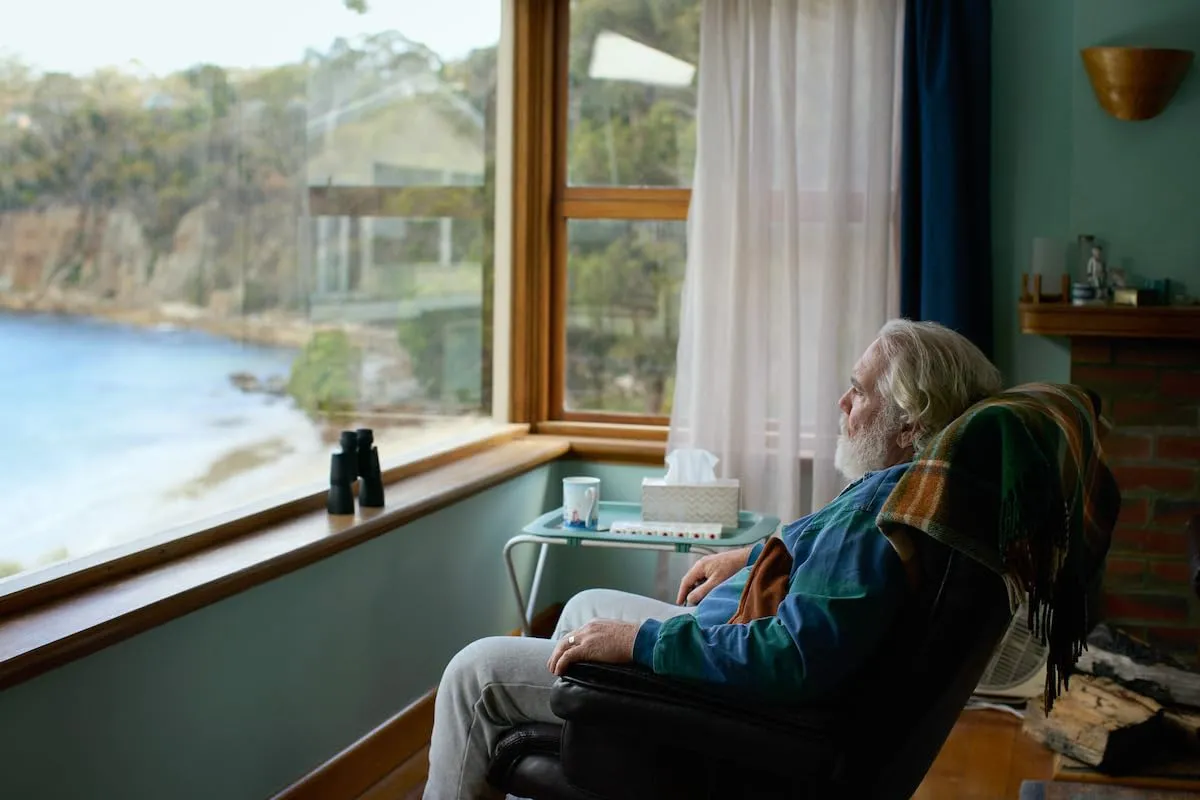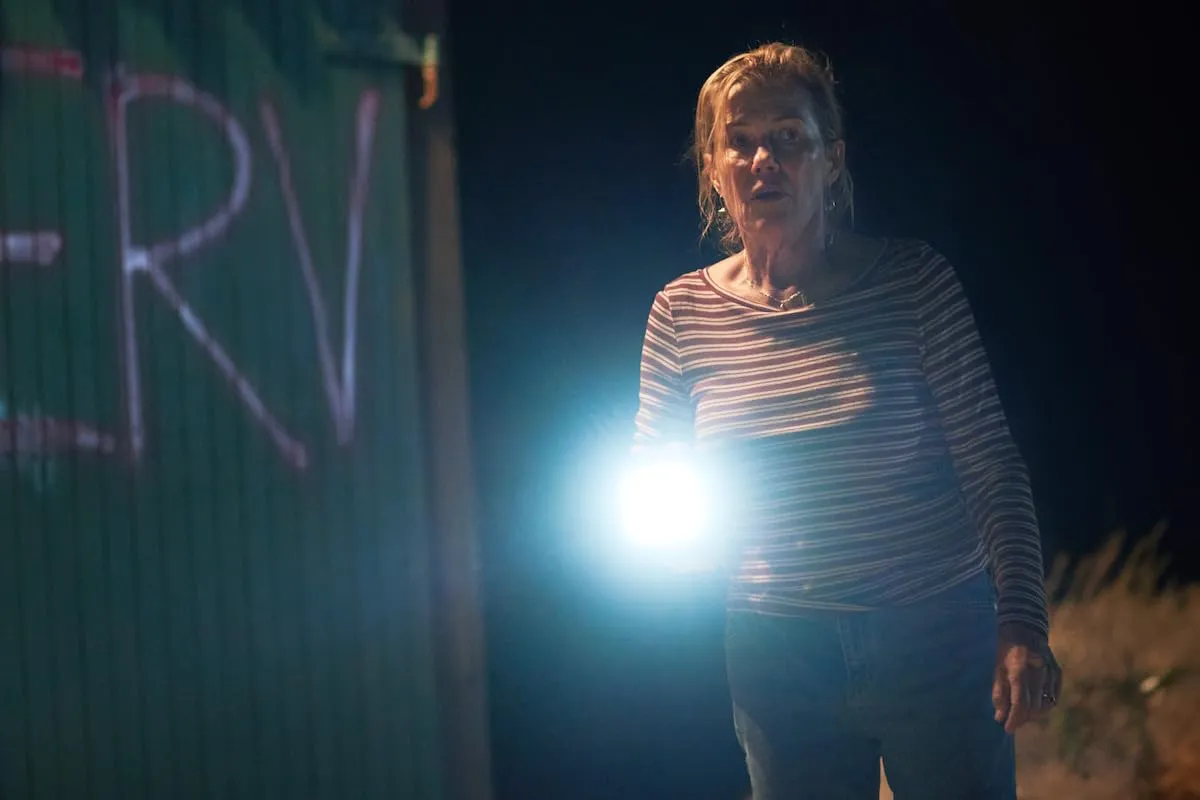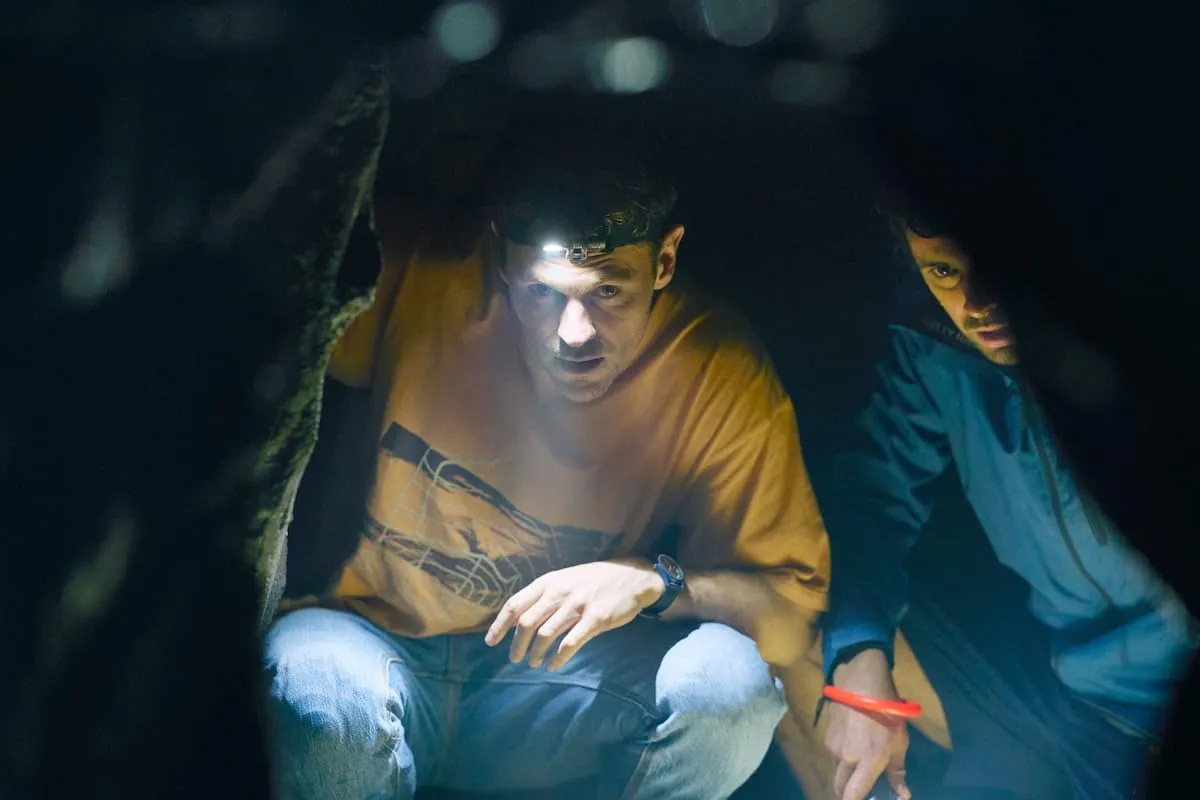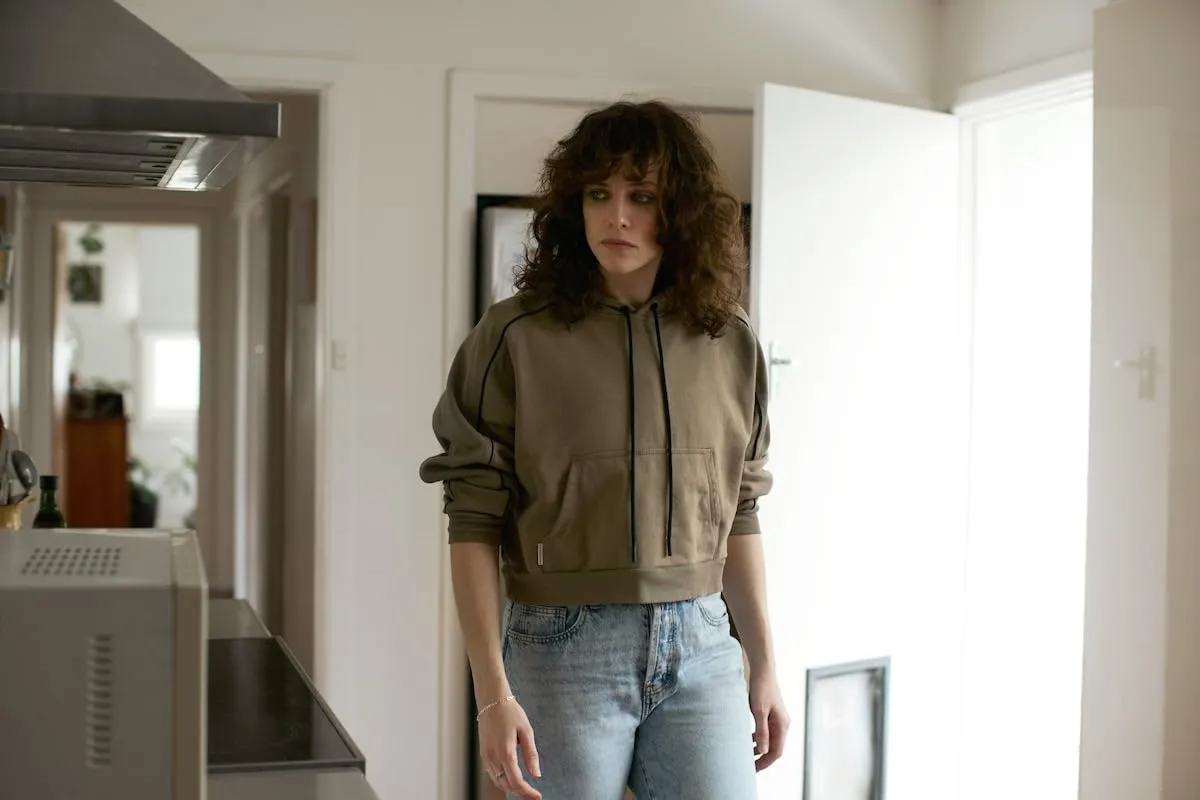There are few narrative setups as reliably potent as the return home, especially when home is a place that has spent years nursing a wound you helped inflict. This is the anchor point for The Survivors, which sees Kieran Elliott (Charlie Vickers) venture back into the suffocating embrace of Evelyn Bay, Tasmania, fifteen years after a fateful decision.
The original trauma is a foundational piece of small-town lore: during a violent storm, Kieran’s brother Finn and a friend, Toby, drowned while attempting to rescue him from a perilous sea cave. He survived; they did not. The town, and more pointedly his own mother, Verity (Robyn Malcolm), has never let him forget it.
Kieran’s reappearance with his partner, Mia (Yerin Ha), and their new baby is timed with a near-perfect sense of dramatic cruelty, coinciding with the anniversary of the deaths. He finds a father (Damien Garvey) lost to the fog of dementia and a mother whose grief has long since hardened into a sharp, unforgiving resentment. The rugged beauty of the Tasmanian coast does little to mask the oppressive atmosphere of Evelyn Bay, a community where grudges are tended like heirlooms and the past is an active, malevolent presence.
The Architecture of Resentment
A story like this lives or dies by the believability of its core wounds, and The Survivors constructs its interpersonal conflicts with methodical precision. The narrative weight rests squarely on the shoulders of Kieran, a man who carries his guilt not as a dramatic burden but as a kind of atmospheric pressure that has shaped him.
Charlie Vickers portrays this internalized suffering with a stillness that speaks volumes; his Kieran is a man long past fighting his own demons, having resigned himself to cohabitating with them. This quiet agony is immediately externalized by the town of Evelyn Bay, a place where a fifteen-year-old grudge is still considered fresh.
The welcome-home party consists of open hostility from Julian, the father of the other dead boy, and his seething son, Liam. While a few old friends offer tepid support, they are the exception that proves the rule: this community has built its identity around Kieran’s culpability.
Nowhere is the architecture of resentment more pronounced than within the Elliott family home. The series wisely positions Verity, the mother, as the story’s most potent antagonist. Robyn Malcolm’s performance is a masterclass in acidic resentment, portraying a woman whose grief has been sharpened by time into a weapon she wields with devastating accuracy.
A flashback to her screaming at a teenage Kieran in his hospital bed is not just backstory; it is the foundational text for their entire relationship. Her bitterness is contrasted with the tragic haze of her husband, Brian. As played by Damien Garvey, Brian’s dementia creates moments of profound pathos, particularly when he mistakes his living son for the one who died. It is a cruel, recurring echo of the initial loss.
Into this maelstrom walks Mia, Kieran’s partner. Yerin Ha gives her a weary resilience that makes her the audience’s anchor in this sea of dysfunction. As a new mother navigating a town that views her child as the grandchild of a pariah, her conflict is immediate and tangible, grounding the series’ exploration of long-term trauma in the practical anxieties of the present.
The Echo of a Crime
Just when Evelyn Bay seems to have reached its maximum capacity for misery, the story introduces a narrative accelerant. The discovery of a young woman’s body on the beach, identified as a summer visitor named Bronte, effectively shifts the series from a brooding character study into an active thriller.
Her death acts as the plot’s primary engine, a present-day crime that refuses to stay in the present. The structural purpose of Bronte’s murder becomes clear shortly after: she was not a random victim but a narrative key, sent to unlock a door the town had long since bolted shut.
The script reveals that Bronte was in Evelyn Bay investigating a ghost. She was looking into the fifteen-year-old disappearance of Gabby Birch, a local teenager who vanished on the very same stormy night that claimed the lives of Finn and Toby.
Gabby’s case, it turns out, was a footnote, a forgotten tragedy completely eclipsed by the more dramatic and public deaths of the two boys. By linking the new murder to this cold case, the writers skillfully braid two timelines together, ensuring the past is not just remembered through flashbacks but actively interrogated through a new investigation.
This forces a complete re-examination of the town’s foundational trauma. Bronte’s death makes the past inseparable from the present, and the long-accepted story of that night begins to fracture under the pressure.
The series handles the subsequent investigation with a refreshing commitment to procedural realism. There is no brilliant, eccentric detective arriving to solve the puzzle. Instead, the police work is straightforward—interviews, DNA samples, evidence gathering. This choice wisely keeps the focus where it belongs: on the community itself as its secrets are exhumed and its carefully constructed lies begin to unravel.
The Social Autopsy of Evelyn Bay
Once the narrative machinery is in motion, The Survivors reveals its true ambition is not merely to solve a crime, but to perform a social autopsy on its setting. The series treats grief as an active agent in the story, an environmental toxin that has leached into the soil of Evelyn Bay for fifteen years.
It’s a force most powerfully embodied by its mothers: Verity’s sorrow has metastasized into a Directed by Cherie Nowlan and Ben C. Lucas. What both of them do is that they maintain a tense, splenetic mood throughout the series. The feelings of friendliness and discomfort coexist in the scene where Kieran and Mia visit the local bar for the first time.
There are also traces of what appears to be sexual tension, but the show dismisses the notion (at least in one case) explicitly. It replaces carnality with grief, but I don’t think I fully bought what The Survivors was selling, simply because a scene where two characters were sitting close to one another and touching one another was stitched with a moment in the past where the same two characters, as teenagers, were about to kiss.
We are led to believe that romance will reignite between these two individuals. But then the show hits you with a profound explanation, which, well, didn’t feel very convincing. What all this means is that The Survivors exhibits all the signs of a chintzy Netflix Original that derives its juice from violence and nudity.
The Survivors, however, also tries to distance itself from such productions by not submitting to these easy pleasures. Its main task is to remind us of the importance of being a good friend and a good parent. Without them, you cannot become a good citizen. Men, especially, pivot towards all kinds of ugly, creepy things to maintain the image of “masculinity.”
I think I am enjoying this ongoing trend where TV shows are pointing their fingers at children, parents, and the toxic society (it could become a cliché in the future). Almost everybody everywhere is evolving backward. Regressive thoughts and traditional viewpoints are being embraced confidently. I don’t think The Survivors is a terrific series. It could have benefited from more details, more depth. Given Brian’s condition, shouldn’t he be taking some medicines?
There is no conversation about or with doctors and, by extension, no discussion of medical bills. What kind of jobs do Mia and Kieran have that allow them to extend their vacation at will? One character behaves arrogantly with a police officer who requests CCTV footage from him. But why? Of course, we suspect him; however, nothing substantial comes out of this point. The Survivors doesn’t tell us anything we don’t already know about the world we live in.
It doesn’t even use Evelyn Bay and its residents to expose the rot and the vulnerabilities in our relationships and society in a new light. Yet, The Survivors is entertaining in its own way, and the six episodes keep the momentum brisk and tight. It does its job competently. directed rage, while Trish’s pain for her forgotten daughter, Gabby, manifests as a quieter but equally persistent ache.
The show uses this emotional landscape to make a pointed, if subtle, critique of the town’s patriarchal values. The central piece of evidence is the narrative itself: the deaths of two young men became a defining local legend, while the simultaneous disappearance of a teenage girl was treated as an afterthought. This hierarchy of remembrance speaks volumes.
The series extends this observation to the present, where a capable outsider like Mia is subjected to constant emotional pressure and judgment. This is mirrored by an examination of fragile masculinity, seen in the festering anger of men like Julian and his son Liam, whose grief expresses itself as a volatile rage, ever ready to lash out at a perceived slight.
All of this is allowed to fester because of the town’s defining characteristic: its suffocating insularity. Evelyn Bay operates like a dysfunctional family, where intimacy is a tool for control. Everyone’s shared history makes it easier to conceal evidence, maintain alliances, and nurture resentments over decades. It’s a place where everyone knowing your name is both a comfort and a threat.
The Human Landscape
A narrative this steeped in psychological turmoil requires a cast capable of carrying its emotional weight, and The Survivors is anchored by a set of finely tuned central performances. Charlie Vickers gives Kieran a heavy, haunted quality, while Yerin Ha provides a necessary center of gravity as the resilient Mia. The show’s most potent energy, however, comes from the older generation.
As the matriarch Verity, Robyn Malcolm is terrifyingly good, delivering her lines with a bitter precision that makes her one of the more memorable screen antagonists in recent memory. Counterbalancing her venom is Damien Garvey’s heartbreaking work as Brian; his portrayal of dementia avoids caricature, finding the profound sadness in a mind that has become its own unreliable narrator.
Directors Ben C. Lucas and Cherie Nowlan marshal these performances within a tightly controlled atmosphere of dread. The mood is consistently tense and splenetic, creating an unsettling emotional grammar where even moments of friendliness, like an early visit to the local pub, are laced with palpable discomfort. This human ugliness is thrown into sharp relief by the rugged beauty of the Tasmanian coast.
The cinematography uses the setting effectively, presenting a landscape whose stunning vistas offer no comfort to its miserable inhabitants. In a particularly thoughtful visual motif, the endless crashing and receding of waves is used to mirror the inconsistent nature of Brian’s memory. The visual storytelling is workmanlike but effective, serving the characters and mood without calling undue attention to itself.
The Shape of Trauma
Viewers arriving for a straightforward whodunnit may find themselves wrong-footed, because The Survivors is fundamentally a character drama that has commandeered the structure of a mystery. Its primary concern is less about the “who” and more about the sprawling, messy “why” and the emotional debris left in its wake.
The show’s patient pacing and its choice to withhold crucial information from the audience are deliberate narrative designs. This is not a puzzle box inviting you to solve it ahead of the characters; it is a story that wants you to inhabit their slow, agonizing journey toward a truth they have spent years avoiding.
The series leaves you with the potent idea that some wounds cannot be neatly closed. It makes a compelling case that trauma is not an event to be overcome but a permanent feature of the landscape, something that alters the terrain forever. True survival, it suggests, is not about escaping the past, but about the harrowing, imperfect process of learning to live within its shadow.
The Survivors is a six-part Australian drama miniseries that premiered globally on Netflix on June 6, 2025.
Full Credits
Creator: Tony Ayres
Based on: The Survivors by Jane Harper
Directors: Cherie Nowlan (Episodes 1–3), Ben C. Lucas (Episodes 4–6)
Writers: Tony Ayres, Alberto Di Troia, Christian White, Belinda Chayko, Peter Templeman
Producers: Andrew Walker
Executive Producers: Tony Ayres, Jane Harper, Cherie Nowlan, Matt Vitins, Andrea Denholm
Cast: Charlie Vickers, Yerin Ha, Robyn Malcolm, Damien Garvey, Jessica De Gouw, Thom Green, George Mason, Catherine McClements, Don Hany, Martin Sacks, Shannon Berry, Miriama Smith, Johnny Carr, Julian Weeks, Benedict Hardie, Ian Bliss
The Review
The Survivors Season 1
The Survivors masterfully uses its murder mystery framework to conduct a searing autopsy of communal trauma. This is less a whodunnit and more a powerful, character-driven drama about the way grief poisons a community from within. Anchored by phenomenal performances and a palpably tense atmosphere, the series is a patient, haunting, and deeply rewarding exploration of secrets and sorrow. It’s a standout entry in the small-town noir genre that prioritizes psychological depth over procedural thrills.
PROS
- Exceptional performances from the entire cast, especially Robyn Malcolm.
- A deeply atmospheric and tense mood throughout.
- Intelligent, character-focused storytelling that explores profound themes.
- Effective use of the bleak Tasmanian landscape to enhance the narrative.
CONS
- The deliberate pacing may feel slow for viewers seeking a fast-moving thriller.
- Focus on drama means the detective and procedural elements are minimal.
- Its relentlessly grim and oppressive tone can be challenging.




















































